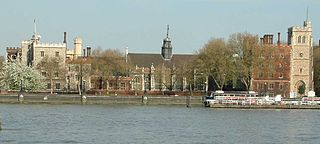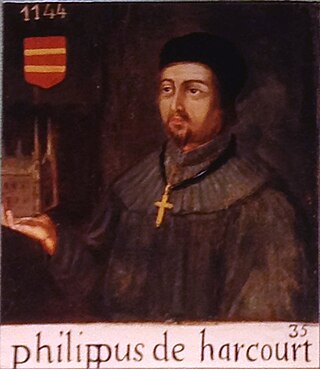Related Research Articles

Boniface of Savoy was a medieval Bishop of Belley in Savoy and Archbishop of Canterbury in England. He was the son of Thomas, Count of Savoy and owed his initial ecclesiastical posts to his father. Other members of his family were also clergymen, and a brother succeeded his father as count. One niece Eleanor of Provence was married to King Henry III of England, and another was married to King Louis IX of France. It was Henry who secured Boniface's election as Archbishop, and throughout his tenure of that office, he spent much time on the continent. He clashed with his bishops, with his nephew-by-marriage, and with the papacy but managed to eliminate the archiepiscopal debt that he had inherited on taking office. During Simon de Montfort's struggle with King Henry, Boniface initially helped Montfort's cause but later supported the king. After his death in Savoy, his tomb became the object of a cult, and he was eventually beatified in 1839.
Theobald of Bec was a Norman archbishop of Canterbury from 1139 to 1161. His exact birth date is unknown. Some time in the late 11th or early 12th century Theobald became a monk at the Abbey of Bec, rising to the position of abbot in 1137. King Stephen of England chose him to be Archbishop of Canterbury in 1138. Canterbury's claim to primacy over the Welsh ecclesiastics was resolved during Theobald's term of office when Pope Eugene III decided in 1148 in Canterbury's favour. Theobald faced challenges to his authority from a subordinate bishop, Henry of Blois, Bishop of Winchester and King Stephen's younger brother, and his relationship with King Stephen was turbulent. On one occasion Stephen forbade him from attending a papal council, but Theobald defied the king, which resulted in the confiscation of his property and temporary exile. Theobald's relations with his cathedral clergy and the monastic houses in his archdiocese were also difficult.
William de Corbeil or William of Corbeil was a medieval Archbishop of Canterbury. Very little is known of William's early life or his family, except that he was born at Corbeil, south-east of Paris, and that he had two brothers. Educated as a theologian, he taught briefly before serving the bishops of Durham and London as a clerk and subsequently becoming an Augustinian canon. William was elected to the See of Canterbury as a compromise candidate in 1123, the first canon to become an English archbishop. He succeeded Ralph d'Escures who had employed him as a chaplain.
John de Gray or de Grey was an English prelate who served as Bishop of Norwich, and was elected but unconfirmed Archbishop of Canterbury. He was employed in the service of Prince John even before John became king, for which he was rewarded with a number of ecclesiastical offices, culminating in his pro forma election to Norwich in 1200. De Gray continued in royal service after his elevation to the episcopate, lending the King money and undertaking diplomatic missions on his behalf. In 1205 King John attempted to further reward de Gray with a translation to the archbishopric of Canterbury, but a disputed election process led to de Gray's selection being quashed by Pope Innocent III in 1206.
Aymer de Valence was a Bishop of Winchester around 1250.

Richard Poore or Poor was a medieval English bishop best known for his role in the establishment of Salisbury Cathedral and the City of Salisbury, moved from the nearby fortress of Old Sarum. He served as Bishop of Chichester, Bishop of Salisbury and Bishop of Durham.

Philip de Harcourt was a medieval Lord Chancellor of England and Bishop of Bayeux. He was unsuccessfully elected as the Bishop of Salisbury.

Godfrey Giffard was Chancellor of the Exchequer of England, Lord Chancellor of England and Bishop of Worcester.

Henry of Blois, often known as Henry of Winchester, was Abbot of Glastonbury Abbey from 1126, and Bishop of Winchester from 1129 to his death.

Peter des Roches was bishop of Winchester in the reigns of King John of England and his son Henry III. He was not an Englishman, but rather a native of the Touraine, in north-central France.
Ralph Neville was a medieval clergyman and politician who served as Bishop of Chichester and Lord Chancellor of England. Neville first appears in the historical record in 1207 in the service of King John, and remained in royal service throughout the rest of his life. By 1213 Neville had custody of the Great Seal of England, although he was not named chancellor, the office responsible for the seal, until 1226. He was rewarded with the bishopric of Chichester in 1222. Although he was also briefly Archbishop-elect of Canterbury and Bishop-elect of Winchester, both elections were set aside, or quashed, and he held neither office.
Nicholas of Ely was Lord Chancellor of England, Bishop of Worcester, Bishop of Winchester, and Lord High Treasurer in the 13th century.
Richard of Ilchester was a medieval English statesman and prelate.
Herbert Poore or Poor (died 1217) was a medieval English clergyman who held the post of Bishop of Salisbury during the reigns of Richard I and John.

The Bishop of Winchester is the diocesan bishop of the Diocese of Winchester in the Church of England. The bishop's seat (cathedra) is at Winchester Cathedral in Hampshire.
John of Oxford was a medieval Bishop of Norwich.
Simon of Elmham was a medieval Bishop-elect of Norwich.
John Gervais was a medieval Bishop of Winchester.
Richard de la More was a medieval clergyman who was Bishop-elect of Winchester from 1280 to 1282. He was also an MP for Gloucestershire from 1290 to 1295.
William de Taunton was a medieval Bishop of Winchester elect.
References
- British History Online Bishops of Winchester accessed on 2 November 2007
- British History Online Priors of Winchester accessed on 2 November 2007
